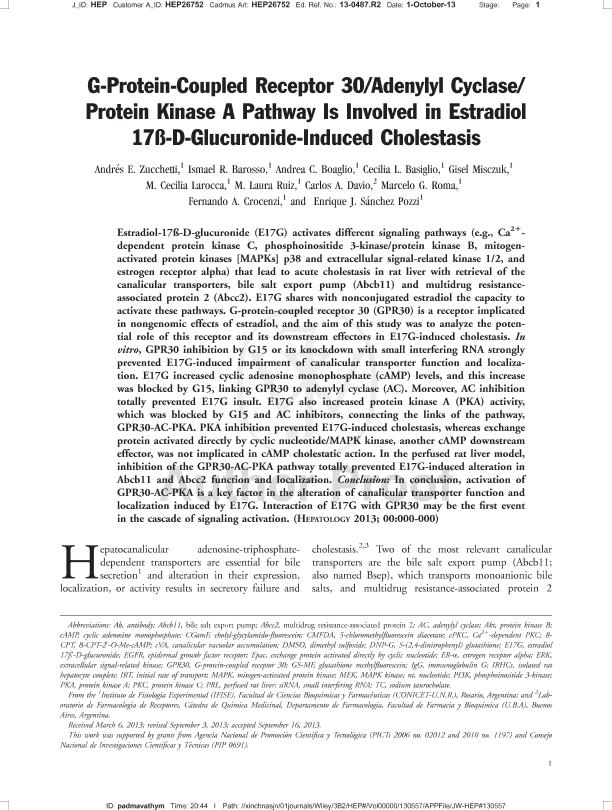Artículo
G protein-coupled receptor30-adenylyl cyclase-protein kinase A pathway is involved in estradiol 17ß-d-glucuronide-induced cholestasis
Zucchetti, Andrés Ernesto ; Barosso, Ismael Ricardo
; Barosso, Ismael Ricardo ; Boaglio, Andrea Carolina
; Boaglio, Andrea Carolina ; Basiglio, Cecilia Lorena
; Basiglio, Cecilia Lorena ; Miszczuk, Gisel Sabrina; Larocca, Maria Cecilia
; Miszczuk, Gisel Sabrina; Larocca, Maria Cecilia ; Ruiz, Maria Laura
; Ruiz, Maria Laura ; Davio, Carlos Alberto
; Davio, Carlos Alberto ; Roma, Marcelo Gabriel
; Roma, Marcelo Gabriel ; Crocenzi, Fernando Ariel
; Crocenzi, Fernando Ariel ; Sanchez Pozzi, Enrique Juan
; Sanchez Pozzi, Enrique Juan
 ; Barosso, Ismael Ricardo
; Barosso, Ismael Ricardo ; Boaglio, Andrea Carolina
; Boaglio, Andrea Carolina ; Basiglio, Cecilia Lorena
; Basiglio, Cecilia Lorena ; Miszczuk, Gisel Sabrina; Larocca, Maria Cecilia
; Miszczuk, Gisel Sabrina; Larocca, Maria Cecilia ; Ruiz, Maria Laura
; Ruiz, Maria Laura ; Davio, Carlos Alberto
; Davio, Carlos Alberto ; Roma, Marcelo Gabriel
; Roma, Marcelo Gabriel ; Crocenzi, Fernando Ariel
; Crocenzi, Fernando Ariel ; Sanchez Pozzi, Enrique Juan
; Sanchez Pozzi, Enrique Juan
Fecha de publicación:
10/2013
Editorial:
Wiley
Revista:
Hepatology (baltimore, Md.)
ISSN:
0270-9139
Idioma:
Inglés
Tipo de recurso:
Artículo publicado
Clasificación temática:
Resumen
Estradiol-17ß-d-glucuronide (E17G) activates different signaling pathways (such as cPKC, PI3K-Akt, MAP kinases p38 and ERK1/2 and estrogen receptor α) that lead to acute cholestasis in rat liver with retrieval of the canalicular transporters bile salt export pump (Abcb11) and multidrug resistance-associated protein 2 (Abcc2). E17G shares with non-conjugated estradiol the capacity to activate these pathways. The G protein-coupled receptor 30 (GPR30) is a receptor implicated in non-genomic effects of estradiol and the aim of this study was to analyze the potential role of this receptor and its down-stream effectors in E17G-induced cholestasis. In vitro, GPR30 inhibition by G15 or its knock down with siRNA strongly prevented E17G-induced impairment of canalicular transporters function and localization. E17G increased cAMP levels and this increase was blocked by G15, linking GPR30 to adenylyl cyclase (AC). Moreover, AC inhibition totally prevented E17G insult. E17G also increased PKA activity, which was blocked by G15 and AC inhibitors, connecting the links of the pathway GPR30-AC-PKA. PKA inhibition prevented E17G-induced cholestasis, whereas Epac/MEK, another cAMP downstream effector, was not implicated in cAMP cholestatic action. In the perfused rat liver model, inhibition of GPR30-AC-PKA pathway totally prevented E17G-induced alteration in Abcb11 and Abcc2 function and localization. In conclusion, activation of GPR30-AC-PKA is a key factor in the alteration of canalicular transporters function and localization induced by E17G. The interaction of E17G with GPR30 may be the first event in the cascade of signaling activation
Archivos asociados
Licencia
Identificadores
Colecciones
Articulos(IFISE)
Articulos de INST.DE FISIOLOGIA EXPERIMENTAL (I)
Articulos de INST.DE FISIOLOGIA EXPERIMENTAL (I)
Articulos(OCA HOUSSAY)
Articulos de OFICINA DE COORDINACION ADMINISTRATIVA HOUSSAY
Articulos de OFICINA DE COORDINACION ADMINISTRATIVA HOUSSAY
Citación
Zucchetti, Andrés Ernesto; Barosso, Ismael Ricardo; Boaglio, Andrea Carolina; Basiglio, Cecilia Lorena; Miszczuk, Gisel Sabrina; et al.; G protein-coupled receptor30-adenylyl cyclase-protein kinase A pathway is involved in estradiol 17ß-d-glucuronide-induced cholestasis; Wiley; Hepatology (baltimore, Md.); 59; 3; 10-2013; 1016-1029
Compartir
Altmétricas



